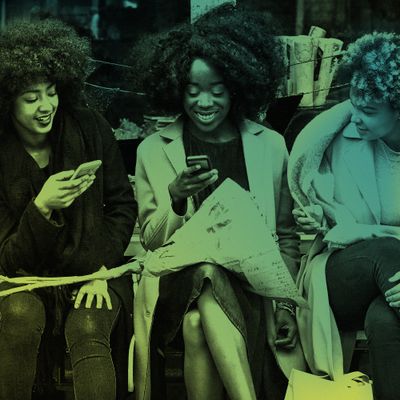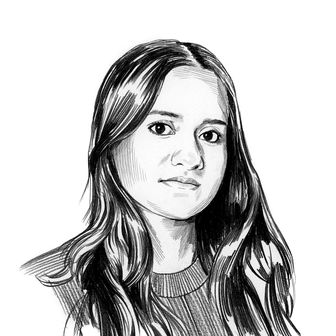
It’s been a year since I’ve swiped through a dating app, but the drudgery still feels fresh: the painful small talk (“Hi,” “What do you do?,” “How do you do?”) that goes nowhere; the corporate bros crowding my queue on both Hinge and Bumble; the couples looking for a third; or, my favorite, the guys I met up with off-line only to find out they were already taken. Most men I matched with turned out to be terrifying flirts (“ur so short I could break you in half by accident”) or plain terrifying (“don’t be a bitch”). The pandemic gave me an excuse to delete all of the apps, and almost immediately, nights felt a little lighter when I wasn’t swiping through Tinder Passport in bed.
But earlier this month, I turned to apps again — this time to make platonic friends. It was my foray back into a social world. I’d become weirdly comfortable with masking and six-feet-apart warnings, the distance they created being conducive to my depressive episodes, and I’d grown used to being on my own. But I missed friendship, the purest form of social connection, free from sexual and familial obligations. I felt ready for it again, but I was also intimidated.
During quarantine, I began seeing a therapist for the first time. The sessions made me realize that I have difficulty drawing boundaries in my relationships. I wanted to do away with the toxic friendships in my life, to do away with the version of myself who never said no. What better way to start anew than by making friends with people who had never met that old version of myself? That said, striking up small talk makes me wonder why I’m not home with my dog. So I knew I needed a little assistance to kick-start this friend-finding quest of mine.
I started my experiment by downloading Wink, an international friend-making app that turned out to be directly linked to Snapchat. “Horrible thirst trap funnel,” one user warned in a review. Still, I tried it out, matching with the rare man who actually wore a shirt. “Add me on snap,” he wrote me. “Why?” I responded, then deleted the app. I perused Clockout, a social-networking app marketed toward young professionals that advertised teeth-pulling events like “Shark Tank Pitch Night” and “Fintech Happy Hour.” I also tried Vina, a rose-tinted, “hey girl hey” app that promised to connect me to “amazing women.” There, I picked my pastel personality categories (Are you a happy-hour girl? Funemployed? A Mary Jane?), wrote a quick bio (“Hi! I’m an anxious wreck who loves to wine and dine”), and clicked go. The app returned zero results. “Edit your filters or spread the word to help grow the community and meet more friends,” it read. “Xoxo.”
Bumble BFF seemed to hold the most promise, if only because its users were actually active. My first week on BFF, I matched with a woman who told me she was there only to recruit her rugby team. I don’t play rugby and am sedentary in all my app photos save for one, where I’m fully lying down. There were a handful of other matches with grad students and landfill engineers, all of whom posted photos of themselves at brunch. We made perfectly fine small talk via Bumble message, but it felt awkward to arrange in-person hangs. Two women I spoke to had made great friends on the app; one even went to her Bumble friend’s wedding. I sent out some invites to women who matched and messaged with me to hang out IRL, but they didn’t respond, which made me feel uncomfortably forward.
One woman I matched with invited me to a pub for lunch. We hadn’t had much friend-text chemistry, but I said yes, figuring it would be less awkward in person. We read our menus over and over in silence. I didn’t know how to approach a platonic date, how to find common ground without flirting. She did aerial yoga and traveled. My hobby was depression naps. “Should we get drinks?” I suggested. She furrowed her eyebrows. “It’s 1 p.m.” It wasn’t until we talked about 90 Day Fiance that the date turned. Suddenly two hours and two cocktails passed, and we were debating whether we’d ever consider being reality-TV contestants. Afterward, I texted her to make future plans. She responded that she’d be traveling that upcoming weekend but we should get together when she was back. I didn’t hear from her for weeks.
All the while, my real friendships, the connections I’d overlooked and undercultivated during my pandemic depression, remained in limbo. But the awkwardness of friend dates with strangers pushed me to start responding to messages I’d left unread for weeks. For the first time in months, I met two friends at La Napa in Brooklyn. We sat inside a cold pink yurt, drinking natural wine and eating guac. I also grabbed brunch with Chelsea, a writer who was in my MFA program. We hadn’t hung out in school, but we’d been supportive of each other’s work, so it was high time for guava mimosas. Not one friend begrudged me for completely disappearing for months over the past two years. (“Have you considered going to a party?” one friend joked when I told her about my experiment.)
Chelsea told me she’d also downloaded Bumble BFF. It was shortly after the pandemic started and after her best friend cut ties with her. For months, she dreamed of this ex-friend; they’d been in each other’s lives since high school. “It was like she was haunting me,” she said. The app was a way to get the friend out of her head by replacing her with a new one. But the act of swiping was strange for her, too. “I used the lens I had for dating — which is heavily skewed toward looks — for women I wanted to be friends with.” One day, when Chelsea was on the couch scrolling, her husband asked, “Why are you choosing all the pretty girls? You’re trying to build a pretty-girl gang.” Chelsea laughed and denied it, but the truth of his comments sat with her. “I was upset with myself that I’d low-key objectified women in a similar way that men consistently objectify us.”
She did end up making one solid friend through Bumble BFF, a woman whom she counts among the most authentic people she knows. “She didn’t replace my ex-best friend,” Chelsea said. “But she has opened a new space in my heart and shown me how healthy sisterhood is possible even if it began with not the healthiest of motives.”
I’d forgotten the basic allure of apps: They’re not just digital douche pools; they’re also places to find people you otherwise wouldn’t have crossed paths with. My friend, who I’ll call Marina and who is in her mid-20s and new to Jersey City, went on a Bumble BFF brunch date earlier this month. She matched with a woman who also was a transplant to the city and single and liked nights out dancing. The woman was Black, which was important to Marina. “I was talking about things I couldn’t talk about with a white girl,” she explained. The two planned to meet at the Ashford. Marina waited alone for a few minutes, nervous since she’d been stood up by a romantic Bumble date weeks earlier. “It would almost hurt more,” she told me after. “With men, it’s like, Fuck this. But if women don’t approve of me, that would hurt.” But her friend date arrived, and the two hit it off, drinking Bellinis, eating mediocre waffles, and judging the men who passed through the bar. The two have already planned their second hangout: They’re going to a take ’shrooms and go to a sex exhibit in the city.
I want that, too. If not with new friends, then maybe with the ones I already have. I’m still not sure if the apps work for someone like me, but the social exhaustion they sparked reminded me of the number of good, healthy friendships I already have — and I am so grateful to those friends for accepting my reappearance with grace. Like Marina, who I asked if maybe we could do ’shrooms sometime, and now we have a weekend planned in April. Or the friend I went to lunch at Parm with last week, laughing as I told her about how my one Bumble friend date never texted me back.
I felt at peace on my walk home, my real-life friendships making me feel whole again. And then my phone buzzed. “Hey girl!” My heart jumped — my Bumble friend date had finally texted me back. “How are you?”
More From This Series
- ‘Two Years Later, I’m Not Over My Friend Breakup’
- I Think About This a Lot: The Best Friendships on TV Edition
- I Want My Friends to Take My Anxiety Seriously





